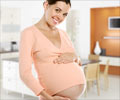Besides cosmetics and lotions, the list of products that expectant mothers should avoid during first trimester include - cleaning solvents, pesticides and NSAIDs.

‘To protect the developing fetal brain from chemicals that can trigger autism, researchers from York University in Canada have suggested that expectant mothers in their first trimester should avoid certain cosmetics, cleaning agents and medicines.’





The researchers said, "Besides cosmetics and lotions, the list of products that expectant mothers should avoid during first trimester include - cleaning solvents, pesticides, nonsteroidal anti-inflammatory drugs such as acetylsalicylic acid, misoprostol (a drug used for inducing labor), polychlorinated bisphenyls used as industrial lubricants, polybrominated diphenyl ethers found in wood and textiles, phthalates in PVC flooring, and children's toys. Aside from the type of chemical a pregnant woman is exposed to, the duration, the frequency and the concentration level also impact a developing brain at the prenatal stage."
Study co-author Christine Wong said, "We recommend that women learn about health effects from exposure to chemical substances in the environment. Prenatal brain development undergoes constant changes and its normal functioning depends greatly on the presence of specific genes at any given time. Since environmental factors influence the expression levels of these critical genes, it is important for an expectant mother to be aware and cautious of exposure to these factors."
The study was published in the European Journal of Neuroscience.
Source-IANS















